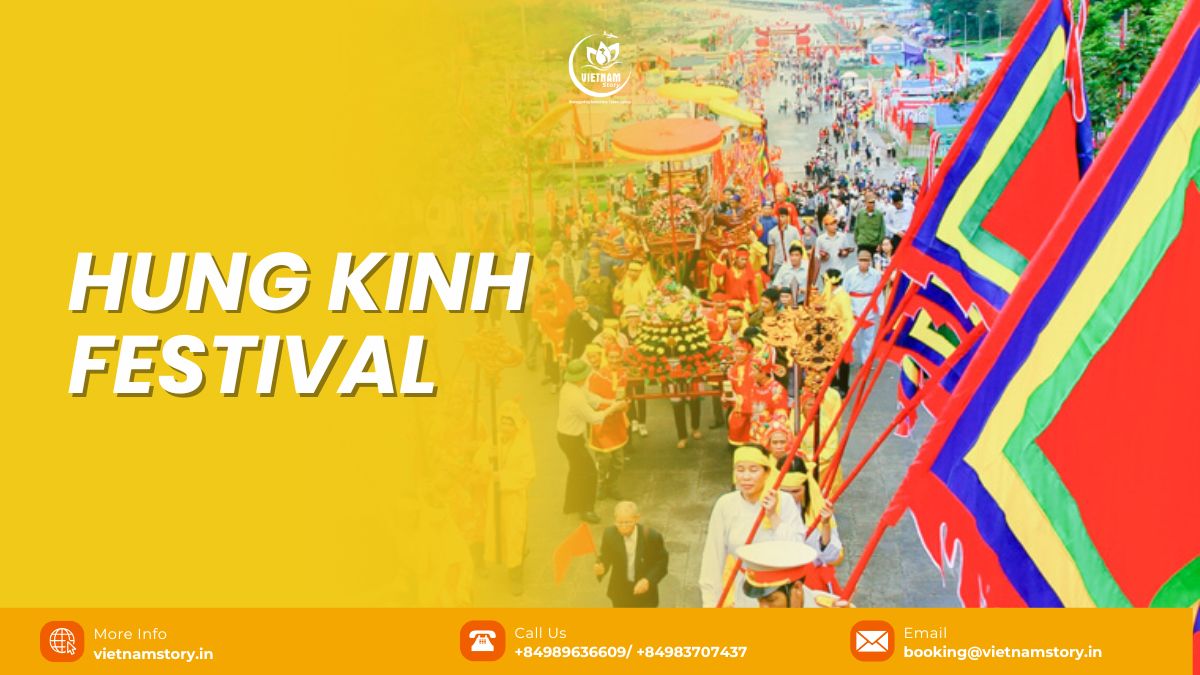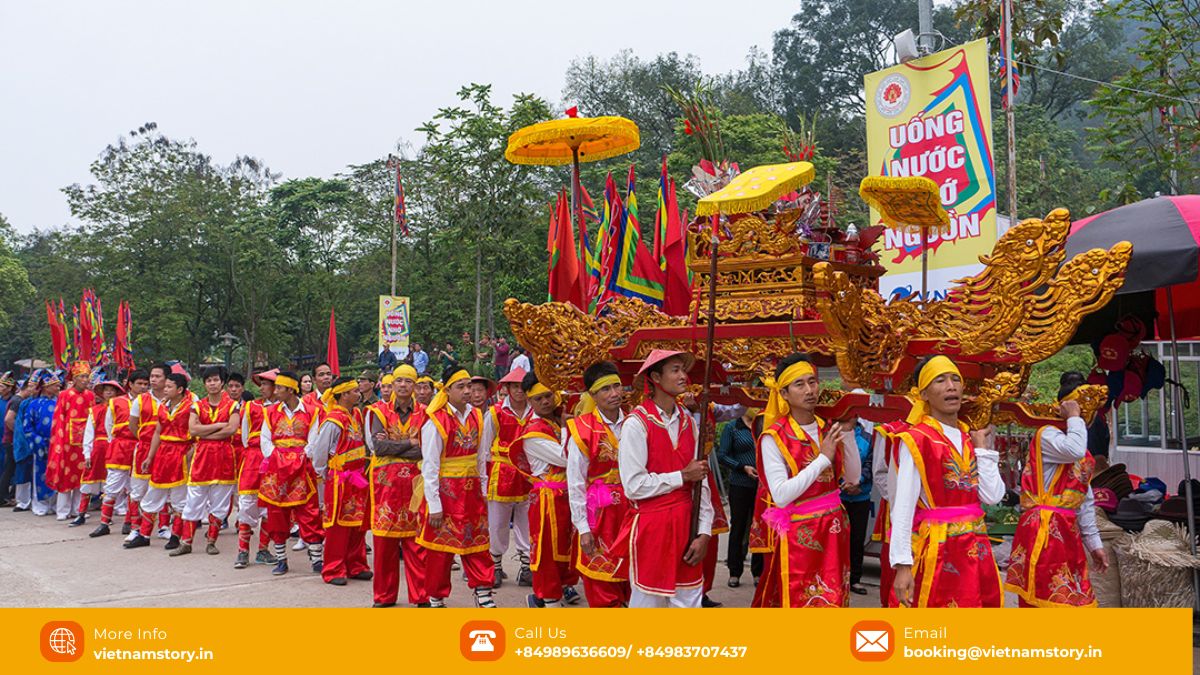The Hung King Festival (Vietnamese: Giỗ Tổ Hùng Vương), a deeply revered national holiday in Vietnam, is far more than just a celebration; it’s a profound journey into the heart of Vietnamese national identity and ancestor worship. Held annually with the main celebration on the 10th day of the third lunar month, this vibrant festival commemorates the legendary Hùng Kings, universally considered the founders of the Vietnamese nation, known historically as Van Lang. Primarily centered in the ancestral land of Phu Tho Province, it’s a time of national unity, a vivid display of unique Vietnamese culture and heritage, and a powerful testament to the enduring spirit of the Vietnamese people. For visitors, especially those from India seeking deep cultural immersion, experiencing the Hung King Festival offers an unparalleled opportunity to connect with Vietnam’s rich history and its profound sense of national pride, rooted in ancient legends and traditions.

Unveiling the Legends and History: The Roots of Vietnamese Identity
The origins of the Hung King Festival are steeped in captivating ancient legends, forming the bedrock of Vietnamese history and identity. Central to this is the myth of Vietnam’s genesis: the union between Lạc Long Quân, a powerful Dragon Lord from the sea, and Âu Cơ, a graceful Mountain Fairy. Their extraordinary romance resulted in a sac containing one hundred eggs, from which hatched one hundred children – the progenitors of all Vietnamese people, often referred to as “Descendants of Dragon and Fairy“.
Their eldest son ascended the throne as the first of the 18 generations of Hùng Kings, rulers of the first Vietnamese state, Van Lang. While ancient texts date their reign from 2879 BC, archaeological evidence suggests a period between 1000 and 500 BC. Regardless of the exact timeline, the Hùng Kings are credited with establishing the foundations of Vietnamese civilization – teaching rice cultivation, hunting, and fostering a deep sense of patriotism and tradition.
These kings are not merely historical figures; they are revered ancestors, symbols of national unity and wisdom. The festival transcends simple commemoration; it’s a living expression of the Vietnamese principle “Uống nước nhớ nguồn” (When drinking water, remember the source), reinforcing a collective identity. Recognizing its profound cultural importance, the Worship of Hùng Kings in Phu Tho was inscribed by UNESCO as an Intangible Cultural Heritage of Humanity in 2012, highlighting its significance not just for Vietnam, but for the world.
When and Where Does the Celebration Unfold?
When is the Hung King Festival Held?
The Hung King Festival culminates on the 10th day of the third lunar month each year, which is the main day of celebration and a public holiday in Vietnam. Festivities, however, often span several days, typically starting from the 8th and lasting until the 11th day of the lunar month. (For 2025, the main festival day falls on April 7th).
Where is the Heart of the Festival?
While over 1,400 Hung King temples across Vietnam hold observances, the undisputed epicenter is the Hung Temple Complex (Khu di tích lịch sử Đền Hùng) located on the sacred Nghia Linh Mountain in Phong Chau District, Phu Tho Province. Situated north of Hanoi, this area is considered the ancestral homeland of Vietnam. Millions make the pilgrimage here annually, making it the focal point of national commemorations. The complex includes several key temples like the Lower Temple (Đền Hạ), Central Temple (Đền Trung), Upper Temple (Đền Thượng), and Well Temple (Đền Giếng), each playing a role in the pilgrimage route.
Experiencing the Hung King Festival: Solemn Ceremonies and Joyful Festivities
The Hung King Festival beautifully balances solemn rituals (Lễ) with vibrant community celebrations (Hội).
The Reverent Ceremony (Lễ)
The official ceremonies begin at dawn, filled with reverence and national pride. Key rituals include:
- Palanquin Procession (Lễ Rước Kiệu): A magnificent sight where villagers from surrounding areas, dressed in traditional costumes in Vietnam, join government officials in a grand procession. They carry ornate palanquins containing offerings up the steps of Nghia Linh Mountain, moving rhythmically to the sound of traditional music and bronze drums.
- Incense Offering Ritual (Lễ Dâng Hương): Held at the Upper Temple (Đền Thượng), the highest point, this is the most solemn moment. Elders, pilgrims, and state leaders offer incense and prayers to the spirits of the Hùng Kings, Lạc Long Quân, and Âu Cơ, expressing gratitude and respect for the nation’s founders.
- Symbolic Food Offerings: Central to the offerings are Banh Chung (square sticky rice cake) and Banh Giay (round sticky rice pudding). According to legend, Prince Lang Lieu, a son of the 6th Hung King, created these simple yet meaningful cakes. Banh Chung, representing the Earth, and Banh Giay, representing Heaven, symbolise gratitude for the land’s bounty and filial piety. Often, 18 cakes of each type are offered, representing the 18 Hung King generations. Other offerings include fruits, flowers, betel leaves, and areca nuts.

The Lively Festivities (Hội)
Once the formal ceremonies conclude, the atmosphere transforms into a joyous celebration of Vietnamese culture:
- Folk Music and Performances: The air fills with traditional music, including the unique Xoan singing of Phu Tho province, another UNESCO-recognized Intangible Cultural Heritage. There are also vibrant dragon dances and other folk performances.
- Traditional Games: Communities engage in lively traditional games reflecting rural life and martial spirit. Expect to see spirited competitions like bamboo swinging contests, rice cooking competitions, human chess (cờ người), Vietnamese wrestling (đấu vật), and even fun water games like duck catching.
- Local Cuisine: Food stalls spring up, offering delicious local Vietnamese delicacies. It’s a fantastic opportunity to sample authentic regional food while soaking in the festive atmosphere.

Why You Should Experience the Hung King Festival
For travellers, particularly those from India interested in history and vibrant traditions, the Hung King Festival offers an authentic and deeply moving experience. It’s a chance to:
- Witness History Alive: See ancient legends and historical reverence manifest in modern ceremonies and celebrations.
- Connect with Vietnamese Culture: Immerse yourself in unique traditions, music, games, and food that define Vietnamese heritage.
- Observe National Unity: Experience the powerful collective spirit and patriotism as Vietnamese people from all walks of life gather to honor their shared origins.
- Explore the Ancestral Land: Visit the historically significant region of Phu Tho Province and the sacred Nghia Linh Mountain.
READ MORE: Unveiling the rich tapestry of Vietnamese Culture: A Journey for the senses
Practical Tips for Visitors Attending the Hung King Festival
If you plan to experience this incredible festival, especially the main events in Phu Tho:
- Getting There: Phu Tho is about 80-90 km from Hanoi. Options include public buses from My Dinh station to Viet Tri city (then local transport), or hiring a private car/taxi for a more comfortable 1.5-2 hour journey.
- Accommodation: Book accommodation *well in advance* as Phu Tho gets extremely busy. Options range from hotels in Viet Tri city (like Muong Thanh Luxury Phu Tho Hotel, Sai Gon Phu Tho Hotel) to local homestays. Alternatively, stay in Hanoi and arrange an early morning trip.
- Best Time to Visit: Arrive a day or two before the main day (10th of the 3rd lunar month) to experience the build-up and preliminary events.
- Etiquette: Dress modestly, especially when visiting temples (cover shoulders and knees). Be respectful during ceremonies, observe quietly, and always ask for permission before taking photos of people or specific rituals. Wear comfortable shoes for walking, especially up Nghia Linh Mountain.
Conclusion: A Celebration of Enduring Spirit
The Hung King Festival is more than just a holiday; it’s the heartbeat of Vietnamese identity, a powerful testament to the nation’s respect for its ancestors and its enduring cultural legacy rooted in the legendary Hùng Kings. It’s a vibrant tapestry weaving together ancient myths, historical significance, solemn rituals like the incense offering, joyful festivities featuring Banh Chung and Banh Giay, and profound national unity, all centered around the sacred pilgrimage to Phu Tho. By witnessing this incredible event, visitors gain a unique and unforgettable insight into the soul of Vietnam and the unwavering spirit of its people – a truly enriching experience for any traveler seeking cultural depth on their journey.